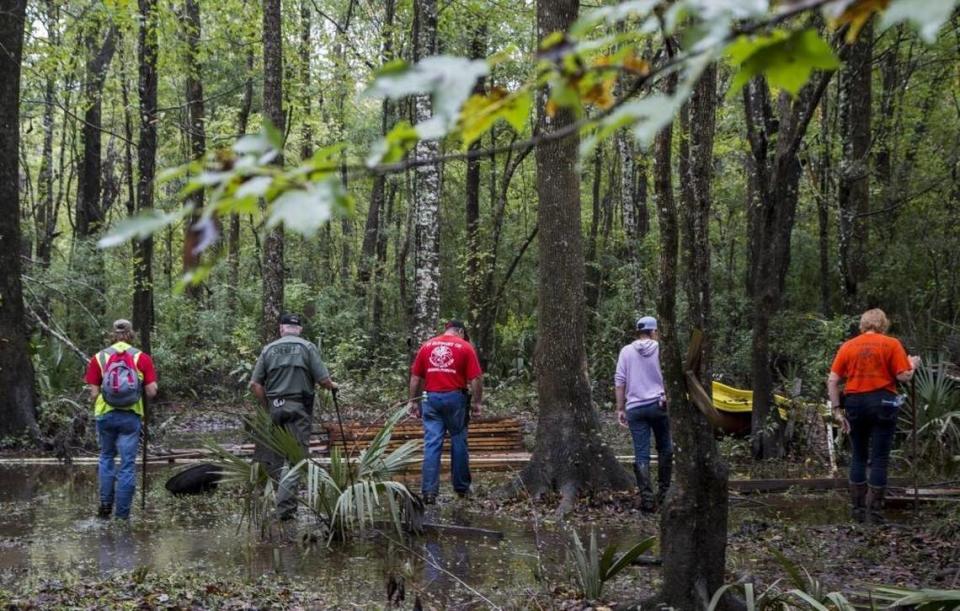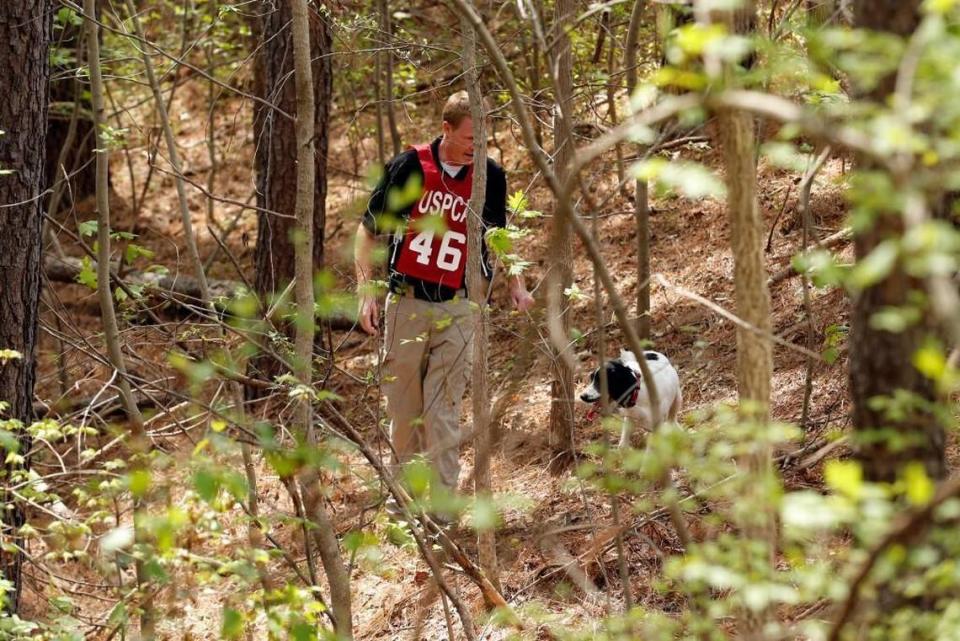Over 700 people are missing in North Carolina. This event could help their families.
You’ve likely seen the homemade posters circulate on Facebook or stapled on telephone poles and community bulletin boards. Posters asking for help finding loved ones.
More than 700 people are missing in North Carolina, according to the North Carolina Center for Missing Persons. An event in the Research Triangle Park on Friday aims to help their families.
RTI International and the North Carolina State Bureau of Investigation are partnering to bring resources to families of missing people with their North Carolina Missing Person Day event.
“If we can help one family, we consider that a success,” said Donia Slack, senior director of RTI’s Department of Justice Strategic Account Executive. “But we would like to get as many people in as possible.”
Posters of missing people across North Carolina will be shared at the event. In a private area, people will be able to look through pictures of unclaimed bodies.
There are about 570 missing person cases where people have been missing for more than five years, according to NamUs, a public, federal database for missing persons.
“In North Carolina, of those cases about a quarter are children under the age of 20,” Slack said. “So the rest of those, 75% or so are adults. And so what’s really challenging when a loved one goes missing that it’s not a crime for an adult to go missing.”
Sometimes foul play is suspected, but there may be other circumstances.
“Sometimes they are victims of circumstance,” Slack said. “Sometimes they might be homeless or they just might want to flee a toxic situation. And you don’t quite know whether or not that person is fine and living somewhere else in another state or if some foul play has fallen upon them.”
Nate Thompson is the assistant special agent in charge who oversees the SBI’s cold case unit, which includes missing persons and unidentified persons. This is the first time this type of event has been held in North Carolina, but they’ve had “huge success” in other states where similar events have been held.
“It doesn’t matter if it’s a missing person, unsolved homicide or unidentified remains,” Thompson said. “It gives the family a sense of justice, possibly, or closure. And every victim deserves that whether all we are able to do is provide a name to an unidentified (body) and return those remains to a family member. We may not be able to solve the case, but in some instances it may open brand new leads that we didn’t know about because we didn’t know who the victim was.”
When is the event and how do I register?
The National Missing Person Day event will be from 10 a.m. to 3 p.m. Friday, Sept. 8 at RTI Headquarters, 3030 Cornwallis Road, Durham. It will be in the multipurpose room on the first floor of the Holden Building.
The event is free and parking is provided. However, people are asked to register for the event. People can register in person the day of the event or online at bit.ly/ncmpday2023.
What should families bring?
It is recommended that families bring the following:
Two biological relatives of the missing person to provide DNA samples
X-rays, dental and medical records, and other identifying documents
Photographs of the missing person, including any photos of tattoos, birthmarks and scars
Police reports, if previously reported
A description of the missing person
Submitting DNA from family members has led to countless cases being solved or closed, Slack said.
“We are encouraging people to use the technology that’s available to them,” she said. “Donate their DNA samples, upload them to DNA databases because we have found that to be an extremely powerful tool in being able to link these cases.”
What agencies will be there?
The National Missing and Unidentified Persons System (NamUs)
North Carolina State Bureau of Investigation
North Carolina Department of Public Safety
NC Office of the Chief Medical Examiner
National Center for Missing and Exploited Children (NCMEC)
High Point Police Department
Raleigh Police Department
Winston-Salem Police Department
Durham County Social Services Department will be there to provide victim services
This is a chance to provide updated information to law enforcement agencies, ask questions and talk to experts from those agencies.
What to do if a loved one goes missing
The North Carolina Department of Public Safety recommends the following if a person goes missing:
File a police or sheriff report. Include information about when and where the person was last seen, names of close friends and family members, and provide a recent photo.
Ask law enforcement to put out a BOLO or “be on the look out” bulletin and ask for an organized search with tracking dogs.
Inform law enforcement about what search efforts have already occurred and the circumstances related to the missing person.
Limit the number of people coming to the missing person’s home until law enforcement has collected evidence.
Write a detailed description of the person and the clothes they were wearing. Include information about birthmarks, scars and tattoos.
Make copies of recent photos for law enforcement, news media and organizations assisting with a search.
Pick one person to answer the phone and keep a pen and notepad nearby to write notes about calls coming in.
For people missing more than 30 days, contact the person’s doctor and dentist to get dental and medical records.
Law enforcement agencies have up to 30 days to enter missing people into the state’s database, Thompson said.
What do the different alerts mean?
The North Carolina Center for Missing Persons, under the North Carolina Department of Public Safety, is the organization that issues alerts like the Amber Alert or Silver Alert. There are five different types of alerts and specific criteria have to first be met first before an alert can be sent.
Law enforcement agencies will first investigate a case and request that the NC Center for Missing Persons send an alert. The center can deny, approve or delay a request depending on the information submitted.
Amber Alerts: This alert is issued for children 17 or younger who are believed to be abducted or to be in danger of injury or death. An alert won’t be issued if the child is a runaway. There have been 10 Amber Alerts in North Carolina so far in 2023.
Ashanti Alerts: This alert is issued for people missing between the ages of 18 and 64, and “the disappearance of the missing adult may not have been voluntary.” The person has to be missing under circumstances that imply they are in physical danger. There have been zero Ashanti Alerts so far this year in North Carolina.
Blue Alerts: These alerts aren’t issued in missing-person cases. These alerts are issued for a law enforcement officer has been killed or seriously injured and the suspect poses a threat to the public and other law enforcement personnel. The sheriff or police chief of the jurisdiction where the officer was injured also has to recommend a Blue Alert. There have been zero Blue Alerts so far in 2023 in North Carolina
Missing Endangered Alert: This alert is issued with a person with a non-medical cognitive impairment is reported missing. The person must be reported to law enforcement within 72 hours, and there has to be a risk of potential abuse, risk of physical harm, neglect or exploitation. There have been 99 Missing Endangered Alerts in North Carolina so far this year.
Silver Alert: This alert is issued when a person is over the age of 50 and has Dementia or Alzheimer’s is missing. The person must be reported to law enforcement within 72 hours, and there has to be a risk of potential abuse, risk of physical harm, neglect or exploitation. There have been 190 Silver Alerts so far in 2023 in North Carolina.





